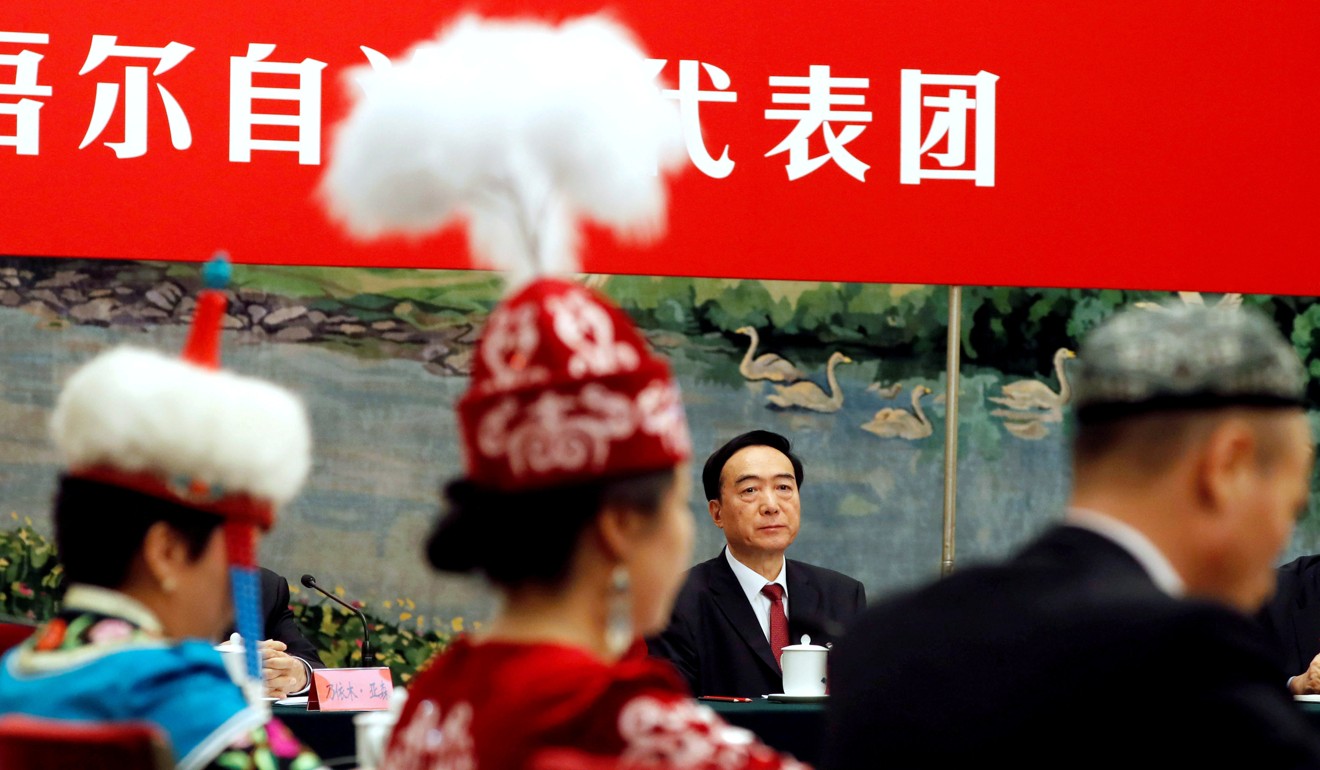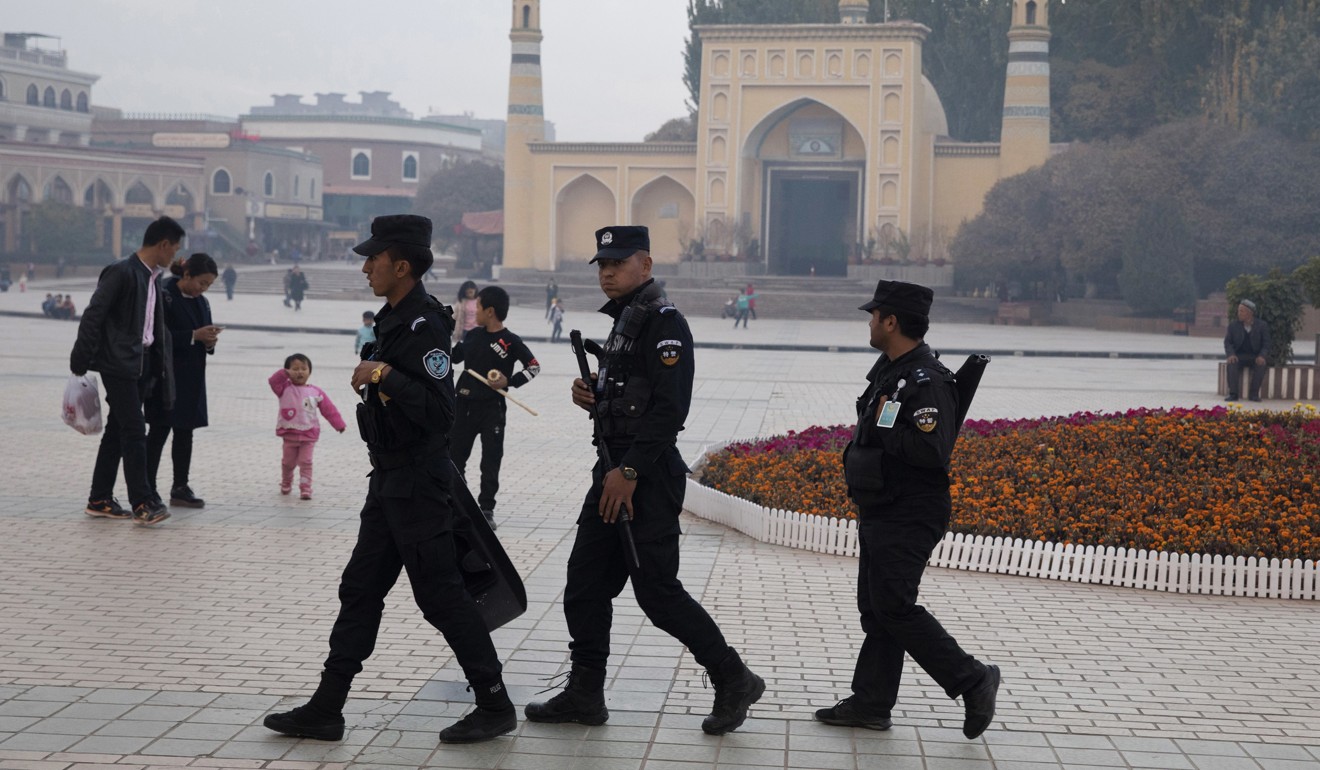
Western envoys seek meeting with Xinjiang Communist Party chief over Uygur rights concerns
- Letter from group says diplomats ‘deeply troubled’ by events in Xinjiang
- Chinese Foreign Ministry says ‘biased attempts to interfere’ are unwelcome
Western ambassadors in Beijing want to meet the senior official of China’s predominantly Muslim Xinjiang region for an explanation of alleged human rights abuses against ethnic Uygurs.
The 15 envoys – led by Canada – made their request in a letter to Chen Quanguo, Xinjiang’s Communist Party leader.
The move is an unusually broad, coordinated action by a group of countries over a human rights issue in China, and illustrates the pressure being brought to bear on Beijing over its policies in the western region.
Chinese foreign ministry spokeswoman Hua Chunying said she had not seen the letter, but the ambassadors had exceeded their diplomatic roles. The letter was based on hearsay and violated the terms of the Vienna Convention governing diplomatic relations, she said.
Hua added that ambassadors were welcome to visit Xinjiang but if “they want to go with the intention of pressuring the Xinjiang government, then this is definitely problematic”.
“As ambassadors, their role should firstly be to positively promote mutual understanding, trust and cooperation between the country where they are stationed and the one they are sent from, and not to gossip, making powerless demands and do things that interfere in that country’s internal affairs,” Hua said.
“We welcome well-intentioned attempts to understand the situation. Xinjiang is an open region. But we will firmly oppose ill-intentioned and biased attempts to interfere in the affairs of our local governments, or rashly criticise China over its internal affairs.”
Foreign minister says Xinjiang camps are terrorism prevention measures
China has said Xinjiang faces a serious threat from Muslim extremists and separatist groups who plot attacks and stir up tensions with the ethnic Han majority.
But Beijing has also been criticised by campaigners, academics, governments and United Nations human rights experts over mass detentions and strict surveillance of the mostly Muslim Uygur minority and other Muslim groups who call Xinjiang home.
In August, a UN human rights panel said it had received what it called many credible reports that a million or more Uygurs in China were being held in what resembled a “massive internment camp that is shrouded in secrecy”.
China says it is not enforcing arbitrary detention and political re-education, but rather some citizens guilty of minor offences were being sent to vocational centres to provide employment.
Beijing is angered by criticism of its human rights situation, espousing a policy of non-interference in the affairs of other countries. Chinese Foreign Minister Wang Yi said on Tuesday the world should ignore “gossip” about Xinjiang and trust authorities there.
It was not clear if the envoys’ letter had been sent or if its contents could be revised. One diplomatic source said it was being circulated with a view to gaining more signatures.
Several other diplomats familiar with the letter would only confirm its existence and refused to discuss it further, citing its sensitivity. All of the diplomats declined to be identified.
Many foreign governments have refrained from speaking out over the Xinjiang situation, with diplomats saying countries are fearful of angering China, an increasingly weighty diplomatic player thanks to its economic clout.
In the draft letter addressed directly to Chen, who outranks the region’s ethnic Uygur governor Shohrat Zakir, the ambassadors said they were very concerned by the UN findings on Xinjiang.

“We are deeply troubled by reports of the treatment of ethnic minorities, in particular individuals of Uygur ethnicity, in the Xinjiang Uygur autonomous region,” the draft reads.
“To better understand the situation, we request a meeting with you at your earliest convenience to discuss these concerns.”
The letter is copied to China’s foreign ministry, the Ministry of Public Security and the Communist Party’s international department.
Pompeo denounces China’s ‘awful abuses’ of detained Muslim Uygurs
The letter carries the names of 15 Western ambassadors, including the Canadian, British, French, Swiss, European Union, German, Dutch and Australian envoys. The other countries’ ambassadors names in the letter are Ireland, Sweden, Belgium, Norway, Estonia, Finland and Denmark.
Four diplomats familiar with the letter and its contents said Canada had taken the lead in its drafting.
Canada’s foreign ministry did not comment directly on the letter but expressed deep concern over the reports of detention and mass surveillance of Uygurs and other Muslims in Xinjiang.
“The minister of foreign affairs raised the situation faced by the Uygurs directly with China’s foreign minister at the UN General Assembly. Canada regularly raises concerns about Xinjiang with Chinese authorities both publicly and privately, bilaterally and multilaterally, and will continue to do so.”

The Australian Department of Foreign Affairs and Trade said the government was concerned about the situation in Xinjiang and officials had conveyed these concerns to China on a number of occasions.
The United States is not represented on the letter, although non-US diplomats said the country had been heavily involved in advocacy on the Xinjiang issue.
“We remain alarmed that since April 2017 the Chinese government has detained an estimated 800,000 to possibly more than 2 million Uygurs, Kazaks and other Muslims in internment camps for political re-education,” a US embassy spokesman said.
“The United States will continue to call on China to end these counterproductive policies and free all those arbitrarily detained. We are committed to promoting accountability for those who commit human rights violations and abuses, including by considering targeted measures against Xinjiang officials.”
The US has said it is considering sanctions against Chen, other officials and Chinese companies linked to allegations of human rights abuses in Xinjiang.
Additional reporting by Associated Press

